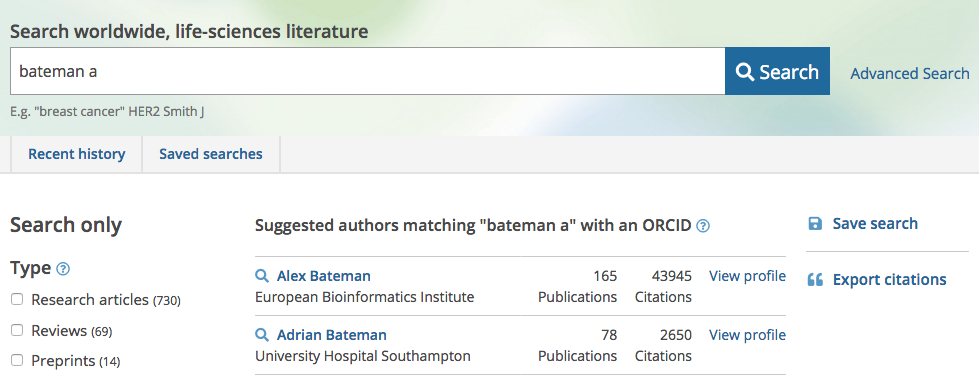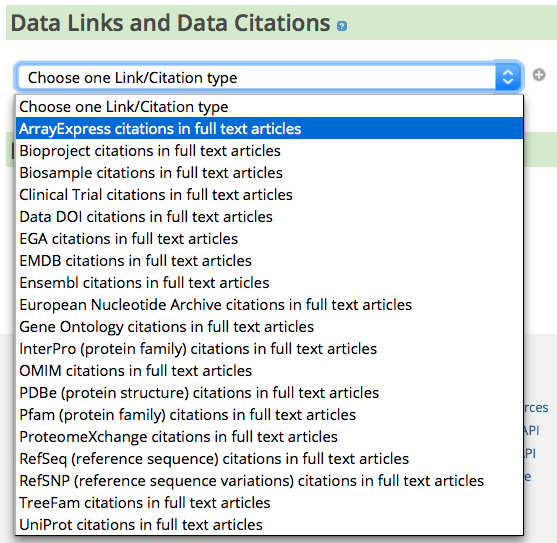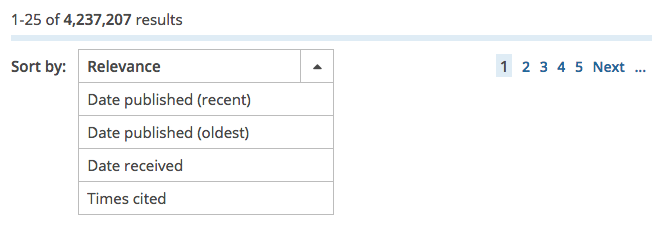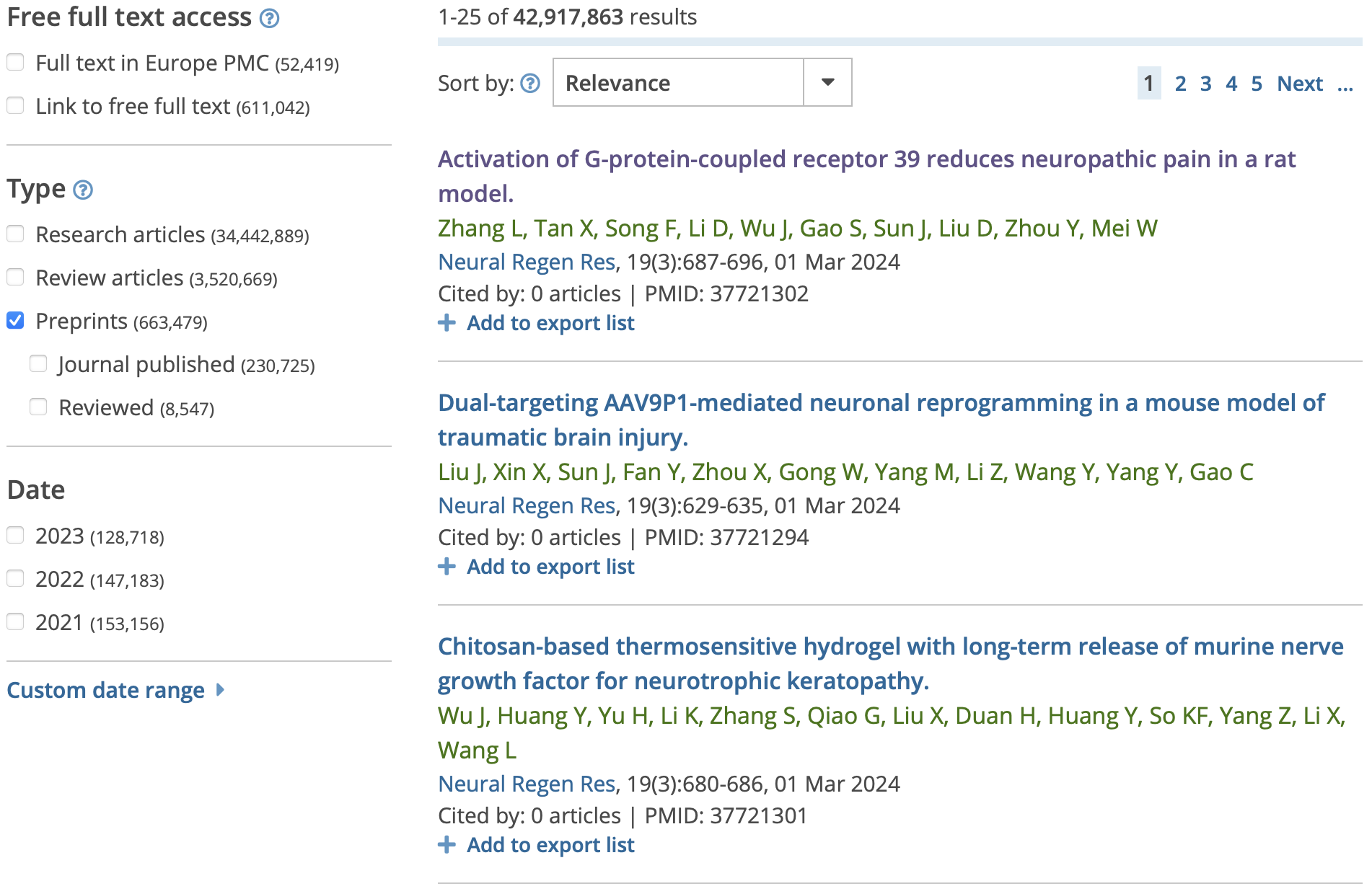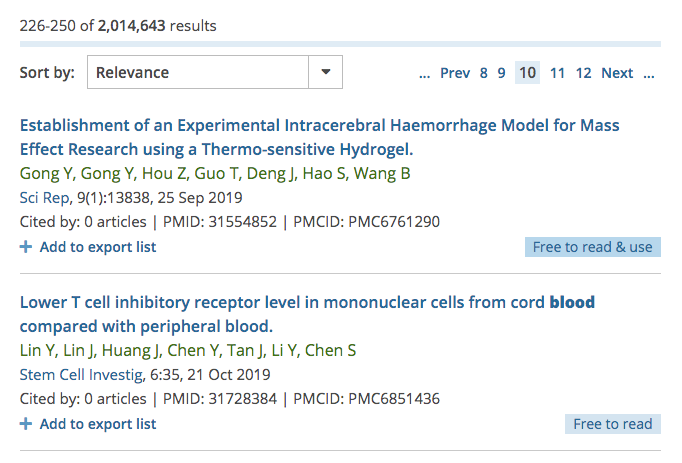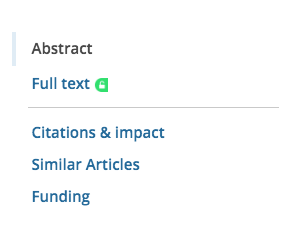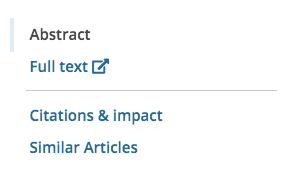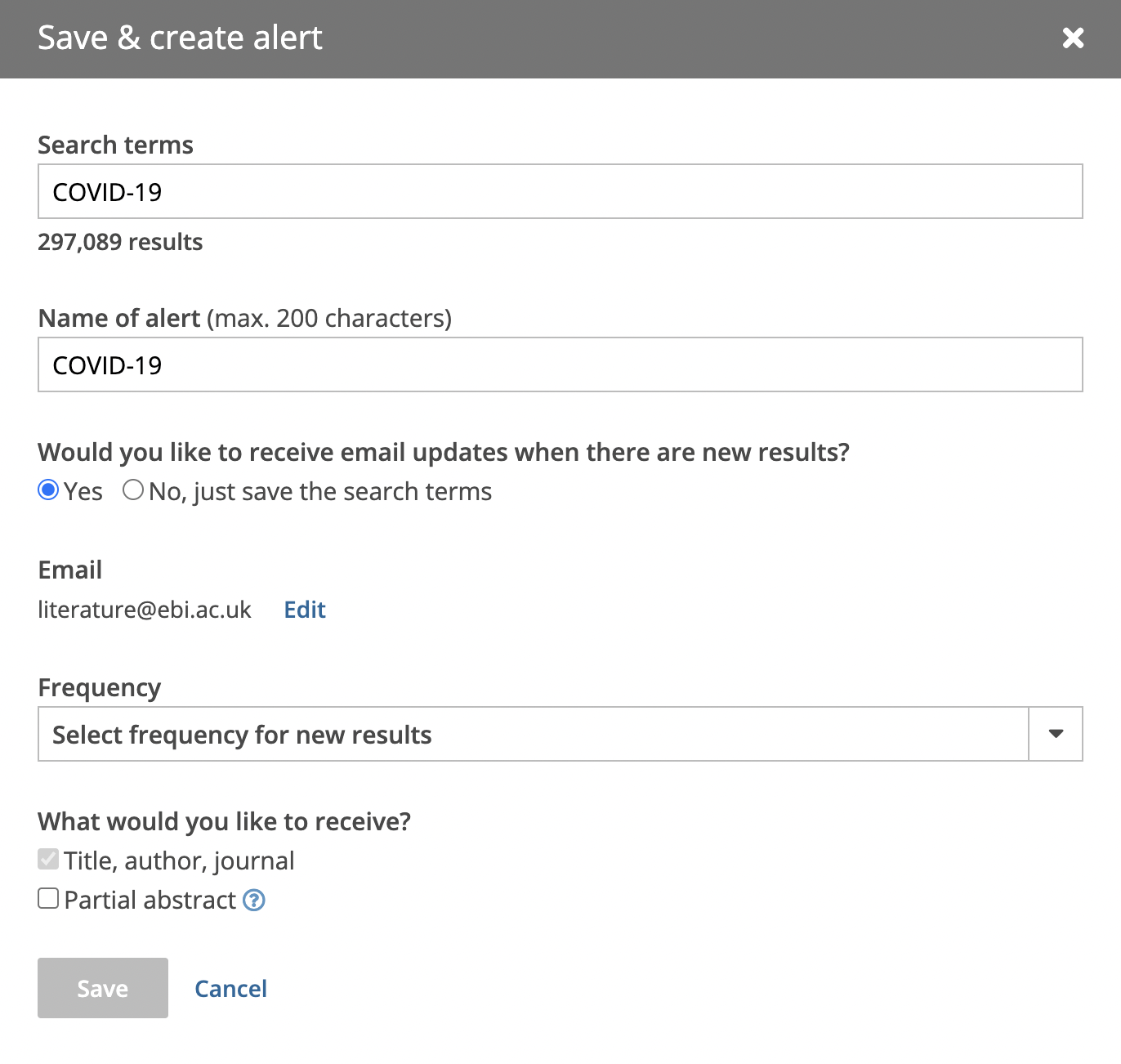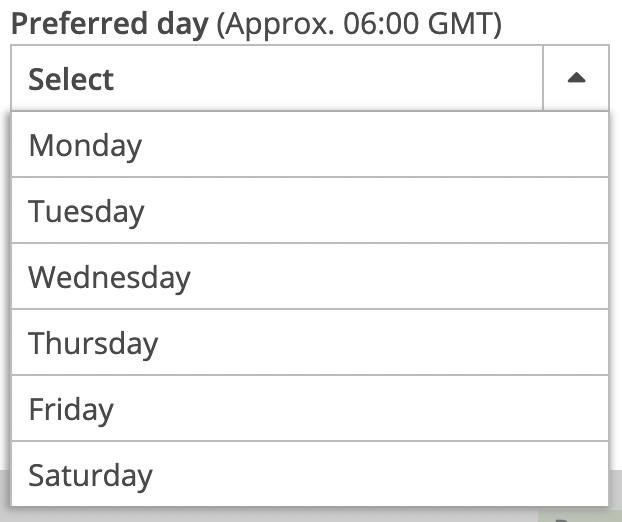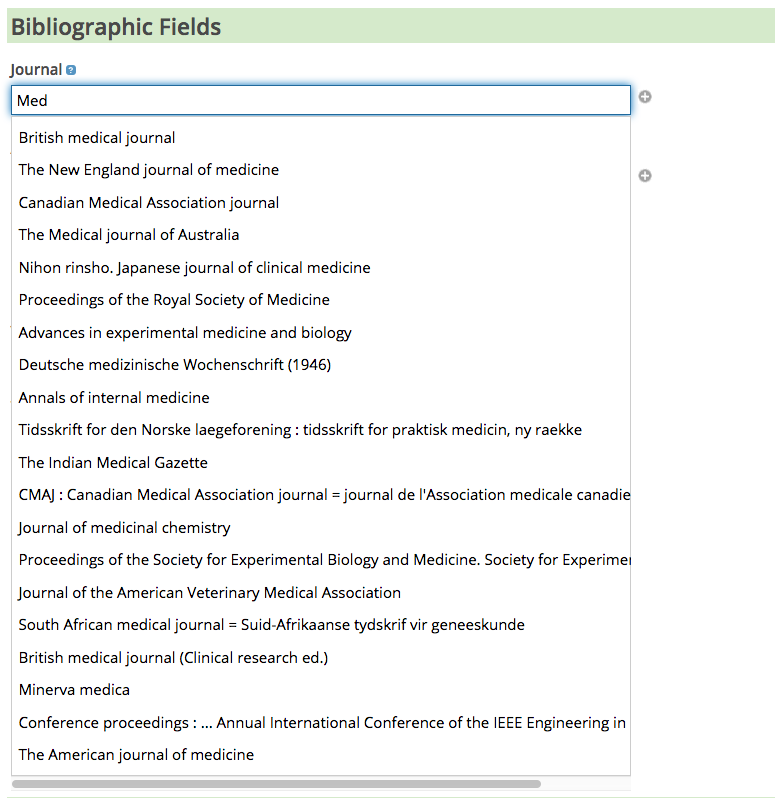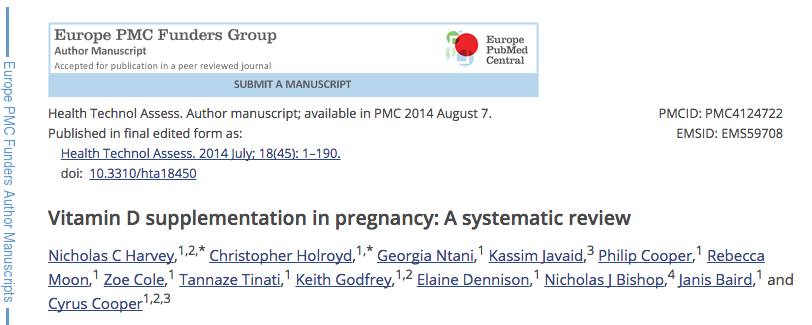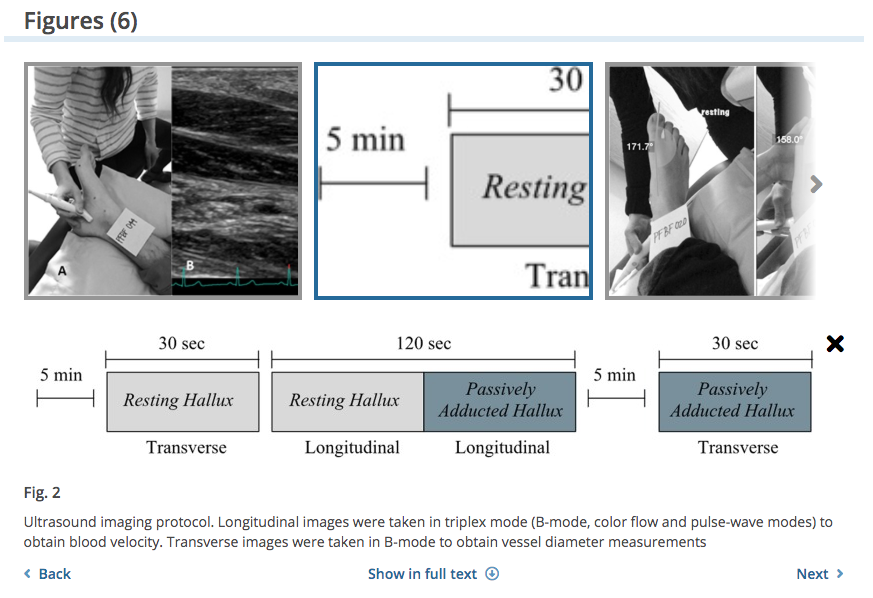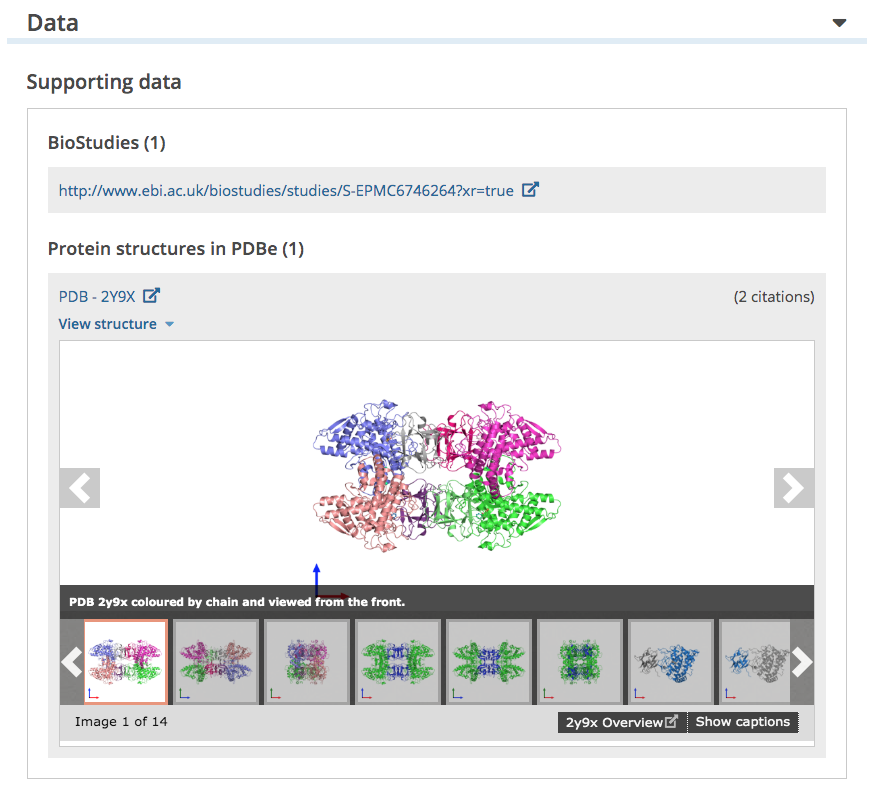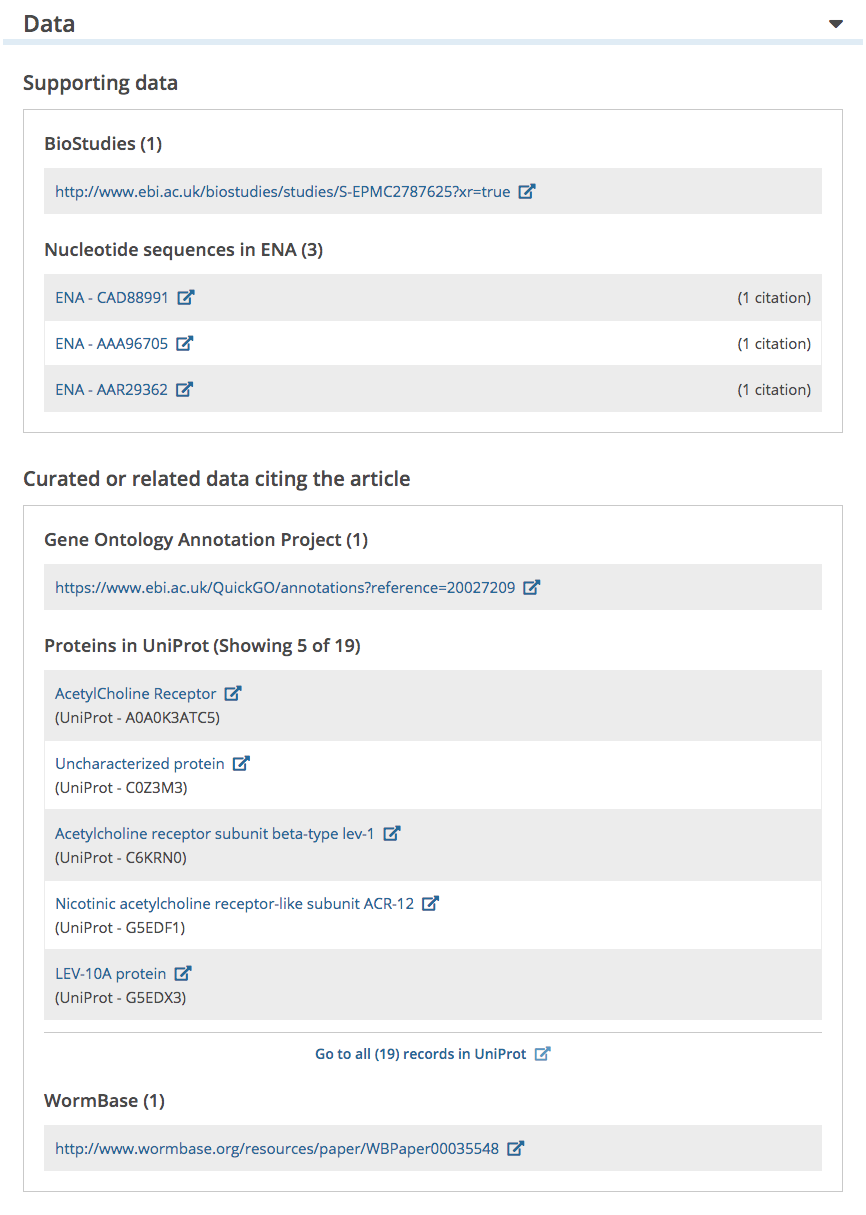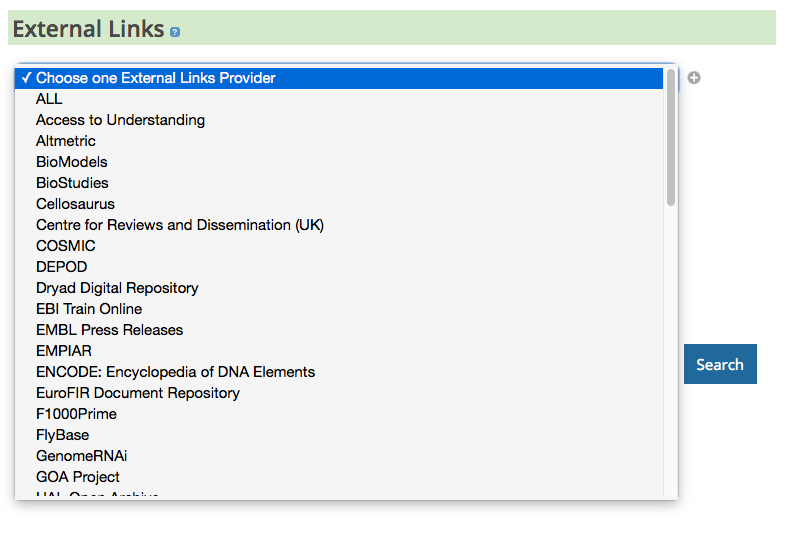Types of content
The content scope of Europe PMC covers both abstracts and full text
articles. Some full text articles are available as open access
content that can be downloaded and reused from the
Europe PMC open access subset.
Find out more about the
sources of content and how content is added to Europe PMC.
Differences between abstracts and full text articles
An abstract is a brief summary of a research article. You can view
the abstract of an article in Europe PMC by following on a search
result.
If available, the full text of an article is available from the
'free to read' label in the search results, or by following the full
text link in the left menu of the article page.
If the article is under a publisher's embargo, the date when the
full text is due to be released by the publisher (the embargo date)
is shown on the article page.
Not all articles in Europe PMC include the full text. Journals that
deposit their articles in PMC, whose content is mirrored in Europe
PMC, fall into one of three categories:
-
For several hundred journals, Europe PMC has the complete contents
of each issue, starting with the first issue. For the older
journals in this group, the back issues of a journal (generally
anything prior to the late 1990s) are available as digitized
(scanned) copies of the original print journal.
-
For a smaller group of journals, Europe PMC has complete issues
and volumes for recent years, but not for all the early years of
the journal.
-
For other journals, Europe PMC does not contain any complete
issues, just a selection of articles, e.g. those that the journal
has published as open access articles.
In all three categories, Europe PMC has a journal's final published
version of the respective articles. In addition to the final
versions of articles provided by publishers, Europe PMC contains
author manuscripts of selected
articles from several thousand other journals.
Preprints
Since 2018, Europe PMC has indexed
772,386 preprints, and versions when available,
to make them searchable alongside journal published articles.
Similar to other articles in Europe PMC, preprints are linked to
data behind the paper, can be claimed to an ORCID, included in
citation networks, and linked to platforms that comment on or peer
review preprints.
A preprint is a complete scientific manuscript that an author
uploads on a public server for free viewing. Initially it is posted
without peer review, but may acquire feedback or reviews as a
preprint, and may eventually be published in a certified
peer-reviewed journal.
For more information about the inclusion of preprints in Europe PMC,
and the COVID-19 preprints initiative, see
Preprints in Europe PMC.
Differences between PubMed, PMC and Europe PMC
Overall, Europe PMC contains more records than both PubMed and
PubMed Central (PMC). In brief, Europe PMC contains all of the
PubMed abstracts, the vast majority of PMC content, plus additional
content including preprints, microPublications, patents, NHS
clinical guidelines and Agricola records.
Full text publisher-provided content in PMC is subject to PMC
Participation Agreements. Since July 2006, when Europe PMC (then
branded as UKPMC) became the first PMC International centre, all PMC
Participation Agreements have included permission to make a
participating journal's content available at Europe PMC. Of those
whose Participation Agreement pre-dates this, most agreed to this
wider distribution of content, however some did not which means that
approximately 250,000 articles in PMC are not available from Europe
PMC; the vast majority of these are back issue articles.
Author manuscripts
Europe PMC Funders' Group organisations
mandate that published research, arising from the research grants
they award, must be made available through Europe PMC. One way this
can be achieved is for authors to submit to Europe PMC (via
Europe PMC plus) the final, peer
reviewed manuscripts of such articles once they have been accepted
for publication (also known as the author's accepted manuscript).
Papers submitted to Europe PMC are made accessible through both
Europe PMC and PMC.
Some funders, most notably Wellcome, prefer the final, published
version of the article to be archived in Europe PMC and have made
additional funding
available to cover the costs related to open access (OA) article
processing charges. In such cases, the publisher - as part of the OA
fee - will take responsibility for uploading the final, published
version of the article into PMC/Europe PMC. However, where
publishers do not offer an OA option, then authors are required to
self-archive author manuscripts in Europe PMC.
Differences between author manuscripts and journal articles
Most articles on Europe PMC are provided by the publisher and appear
as they would on the publisher site. A small proportion of articles
enter Europe PMC as author manuscripts; in this case the article
content is what has been accepted by the journal for publication but
it appears without the journal's house style.
When an author submits an article to a journal, it is reviewed by
one or more independent peer reviewers and the journal's editors,
who decide whether to accept it for publication. As part of this
process, the author may be asked to revise the article to meet the
journal's standards for acceptance. The final accepted manuscript
submitted to Europe PMC (the author manuscript) is the version that
the journal accepted for publication, including any revisions that
the author made during the peer review process.
The published version of the article usually includes additional
changes made by the journal's editorial staff after acceptance of
the author's final manuscript. These edits may be limited to matters
of style and format or they could include more substantive changes
made with the concurrence of the author.
When Europe PMC displays the author manuscript version of an
article, the source data preceding the article title includes a
reference to the published article, as shown below.
Journals
The Europe PMC Journal List includes
journals which deposit content in Europe PMC. Content from a wide
range of other journals is also included in Europe PMC from other
sources. Use the journal field in the Advanced Search to search for
specific journal names.
Non-English articles
Almost all the material in Europe PMC is in English. A few journals
in Europe PMC publish material in more than one language. For
instance, the
Canadian Medical Association Journal
has some articles in (both) French and English. In this case, only
the English material appears in Europe PMC's primary presentation of
an article – the html full-text display. However, the journal's PDF
version of the article may contain material in French as well as
English. Another example is the
Canadian Family Physician
journal, which contains some articles that are available only in
French; in this case Europe PMC provides this in both the full-text
display and the journal's PDF version.
On the Advanced search page there is an
option to filter your search by language. In this instance, the
languages listed refer to the original language of the article.
Abstracts are converted into English once submitted to PubMed.
Copyright restrictions on the use of material
Although access to the material in Europe PMC is free, the use of
the material is still subject to the copyright and/or related
license terms of the respective authors or publishers. See the
Europe PMC Copyright Notice for more
information.
You may not use any kind of automated process to download articles
in bulk from the main Europe PMC site. Europe PMC will block the
access of any user who is found to be violating this policy. Batch
downloading of content in Europe PMC is supported by various methods
including an FTP site, the
Europe PMC-OAI service, and
RESTful and
SOAP web services – the content
available via each method is summarised on the
Developers page.
See the Europe PMC Open Access Subset page
for more information.
ORCIDs
Europe PMC has integrated ORCIDs iDs—unique identifiers for authors,
available from
ORCID—into its website, search systems, and web services via the
ORCID-based Article claiming tool (also
see Link articles to your ORCID). This is
useful for authors who want to display their publications list
unambiguously on the Europe PMC website, allowing them to show for
each article citation counts, linked data sets, and full text
availability in Europe PMC. Millions of Europe PMC articles have
been linked to hundreds of thousands of ORCID iDs, a count that
grows significantly with each update from the ORCID foundation.
ORCID iDs are now shown in two ways on articles:
- In the article author list under the article title.
-
As a list of ORCID iDs in the author information section of an
article.
See, for example,
the article that describes the initial sequence of the human
genome.
If you search for an author using last name and first name or
initial, up to two suggested authors are shown above your search
results if authors with matching names and an ORCID iD are found.
ORCID iDs are also used to create the author profile pages in Europe
PMC. For example,
Alex Bateman's author profile.
Benefits for readers
ORCID-based author searching is particularly useful to find people
who have common last names, or have changed their name, or
contributed as part of a consortium.
Benefits for authors
Articles which have been claimed to ORCID (e.g. using Europe PMC's
article claiming tool) and are publicly available will have an ORCID
iD icon by the author's name. Opening the tooltip by hovering or
tapping on the author name shows the author's affiliation details
which helps to uniquely identify the author. The article will also
appear in the author's profile page.
Citations & Impact
From the article page, you can use the Citations & Impact tab to
see a summary of:
- Articles citing this article
- Database records citing this article
- Recommendations of this article
You will see up to 5 articles which cite the original article, with
a link to view all citing articles.
About the Europe PMC citations network
To show citation counts for individual articles in Europe PMC
requires that reference lists for as many relevant articles as
possible are known, and that the citations within those reference
lists can be identified uniquely, for example, by resolving to a
PubMed ID. The number of "Cited By" articles listed for any
individual article depends not only on the scientific importance of
the article, but also on the size and scope of the dataset from
which the citations have been extracted.
Why are Europe PMC citation counts different to Google Scholar, Web
of Science or Scopus?
The citation dataset available to Europe PMC is based on open
citation data and is smaller than those held by subscription-based
services such as Web of Science or Scopus. Google Scholar also
include citations in content other than peer reviewed articles.
Therefore, the number of citing articles that Europe PMC shows for
any given article is likely to be comparatively smaller than the
number you would see using these services.
Why is the citation information for some articles incomplete?
Occasionally references in the source article are missing because
there is insufficient information or formatting for them to be
displayed on Europe PMC.
Sources of content in Europe PMC
Links to content providers are given in the following list:
| Code | Definition | Details of data source |
|---|
| AGR | Agricola |
Agricola is a bibliographic database of citations to the
agricultural literature created by the US National
Agricultural Library and its co-operators.
http://agricola.nal.usda.gov |
| CBA | Chinese Biological Abstracts |
CBA and the Shanghai Institutes for Biological Sciences
(SIBS) provide EBI with citation data not available in
MEDLINE.
|
| CTX | CiteXplore |
Manual user-submitted records, added by EMBL-EBI, or new
content types such as microPublications.
|
| ETH | EthOs Theses | PhD theses (British Library) |
| HIR | NHS Evidence | UK Clinical guidelines |
| MED | PubMed/MEDLINE NLM |
The National Library of Medicine (NLM) (http://www.nlm.nih.gov/) is the world's largest biomedical library. It explores
the uses of computer and communication technologies to
improve the organization and use of biomedical
information.
MEDLINE: (http://www.nlm.nih.gov/pubs/factsheets/medline.html) the National Library of Medicine's database of
bibliographic citations and abstracts in the fields of
medicine, nursing, dentistry, veterinary medicine, health
care systems, and preclinical sciences.
PubMed:
(http://www.ncbi.nlm.nih.gov/pubmed) the NLM's database of citations for biomedical literature
from MEDLINE, life science journals, and online books
|
| NBK | Europe PMC Book metadata |
This source type denotes full text books on the Europe PMC
Bookshelf that are not initially provided with a PMID 'MED'
source metadata record.
Where a full text book is
received from the NCBI without a corresponding PMID 'MED'
type metadata record, an 'NBK' metadata record will be
created with the same 'NBK' number as the book. The metadata
will be replaced by a PMID 'MED' type record if later made
available. The full text book always retains its 'NBK'
number.
|
| PAT | Biological Patents | http://www.epo.org/ |
| PMC | PubMed Central |
PMC is a free full-text archive of biomedical and life
sciences journal literature at the U.S. National Institutes
of Health's National Library of Medicine (NIH/NLM).
http://www.ncbi.nlm.nih.gov/pmc/ |
| PPR | Preprints |
Preprints are articles which have not been peer-reviewed
from various preprint servers and open research platforms
such as bioRxiv, ChemRxiv, PeerJ Preprints and F1000.
|
How content is added to Europe PMC
Journals and books
Europe PMC mirrors the journal and book content in PubMed and PMC,
with the exception of a few disabled journals, whose publishers did
not give permission before the 2006 PMC Participation Agreements
were in place. The process of adding journals is managed by the
NCBI. A
guide
and
FAQ
is provided to explain the process of adding journals for
publishers, and also to take them through an application. There is
also
guidance for publishers
that would like to add books to the Europe PMC Bookshelf.
Preprints
The metadata and abstracts of preprints are added to Europe PMC from
the Crossref metadata service typically within 24 hours of the
preprint being published.
Europe PMC indexes preprints from the following preprint servers:
-
Access Microbiology
-
AfricArXiv
-
agriRxiv
-
AIJR Preprints
-
ARPHA Preprints
-
arXiv
-
Authorea Preprints
-
Beilstein Archives
-
BioHackrXiv
-
bioRxiv
-
ChemRxiv
-
EcoEvoRxiv
-
Emerald Open Research
-
F1000 Research
-
Gates Open Research
-
Health Open Research
-
HRB Open Research
-
MedEdPublish
-
medRxiv
-
NIHR Open Research
-
Open Research Africa
-
Open Research Europe
-
PaleorXiv
-
PeerJ Preprints
-
Preprints.org
-
PsyArXiv
-
Qeios
-
Research Square
-
SciELO Preprints
-
ScienceOpen Preprints
-
SSRN
-
Wellcome Open Research
Author manuscripts
Authors funded by Europe PMC funders submit manuscripts to Europe
PMC if the published version is not available.
Grant data
Grant award data is currently sent to the Europe PMC Helpdesk where
it is first loaded into GRIST (GRant Information SysTem), and then
into Europe PMC plus. Grant data is publicly available (with the
exception of email addresses) via the
grant finder and the
GRIST API. Grant-article associations are
processed into Europe PMC in the following ways:
Patents
Patents in Europe PMC were provided by the European Patent Office.
ORCIDs
ORCID-article associations are provided in one of two ways:
- Authors link articles in Europe PMC to their ORCID record.
-
Europe PMC receives ORCID-article associations from ORCID.org.
Articles may have been linked to an ORCID by an author via another
source, or automatically by a publisher.
Annotations
Annotations on abstracts and full text articles in Europe PMC are
provided by EMBl-EBI and other text mining groups. See the
Annotations API page for a list of
annotation types and providers.
Citations
Citations in Europe PMC are based on open citation data from PubMed
Central and CrossRef. See more
about the Europe PMC citation network.
